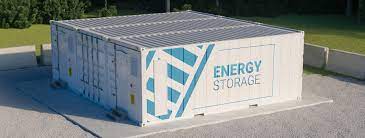Battery energy storage systems are rechargeable battery systems that store energy from solar arrays or the electric grid and provide that energy to a home or business. Because they contain advanced technology that regular batteries do not, they can easily perform certain tasks that used to be difficult or impossible, such as peak shaving and load shifting.

Each energy storage unit contains several components: one or more battery modules, onboard sensors, control components, and an inverter. In DC-coupled units, a separate inverter is used. In AC coupled units, the inverter is integrated into the system. These components make energy storage systems more than mere batteries.
Battery energy storage systems have a wide range of applications. Commercial applications include peak shaving, load shifting, emergency backup, and various grid services. Residential applications include self-consumption, off-grid homes, and emergency backup.
More info on battery energy storage here
You can also want to read: Types of battery used in energy storage systems


